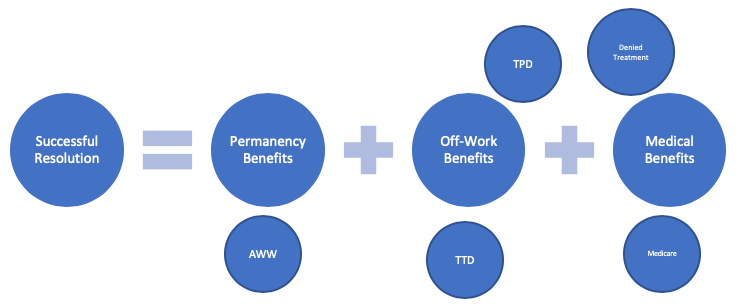Closing That Monster File Lurking in the Corner
It’s important to recall the Illinois Workers’ Compensation Act generally provides a triad of benefits for an injured worker. Those benefits are: payment of medical bills, payment for time off-work, and permanency benefits. Therefore, all issues precluding resolution stem from these three components. Smaller components such as concurrent employment, or who will assume liability for certain medical bills, can hold-up resolution. What is the first step to identifying the small components and closing your file? You must simply know it.

Know Thy File
This can be a daunting task, but your efforts will be rewarded. Though time consuming, I prepare roadmaps. My roadmaps include a brief narrative of accident, claimant’s age, calculation of average weekly wage, and a concise medical chronology. I include periods of off-work or periods of benefits paid. Through this process, you start seeing the sticking points and ancillary issues. It’s also important to note any pertinent third-parties (e.g. Medicare).
Though a daunting task, its reward is often very clear. Having an excellent understanding of your file will almost always put you in a better bargaining position than your opponent.
Know Thy Opponent (Or at least think like one)
The next step is to break the issues down into the party’s respective positions. Your opponent may have already signaled there is an issue that needs to be resolved in their demand.
Once an issue is identified, I define what our best position would be, the claimant’s best position, and the position the Commission may take when examining all the evidence. Consider whether a claimant has even met the elements necessary for entitlement to certain benefits (e.g. concurrent employment). This process helps assess the strengths and weaknesses of your own file. When you understand the bargaining positions, you will be better adept in negotiating and precluding other issues from arising.
Identify Hinderances, Getting to Work, and Knowing Thyself
Preparation and issue identification are key to case resolution. Notwithstanding, corollary issues can hinder a case, especially when a case is ripe, but your opponent may not be prepared to talk.
One strategy is to schedule a meeting at the Commission or at a party’s office. Send frequent reminders and get the Commission involved. You can even ask an Arbitrator to set a status meeting. You can send unsigned contracts for the last offer discussed. The key is to be persistent.
Sometimes parties become dug in. Overcome this issue by discussing the party’s best positions. From there, you will likely meet some middle-ground.
If still dug in, approach the Arbitrator in an informal conference. This will also allow you to gauge the veracity of your position without a full trial. When I commit to pre-trial conferences, I always request the claimant be present and I bring settlement documents. Should the parties be able to resolve the issues, all pertinent parties sign the contracts and they can immediately be approved.
One of the last things I can recommend is to dedicate a portion of the day, or in the very least, your week, to solely work on the file. At that time, do all of your follow-ups and any other work that you possibly can do to get the file closed. I keep a list of all claimants at maximum medical improvement. Set up a calendar appointment. Create a list, a spreadsheet, or some other way of monitoring your progress and next steps.
Closing Thoughts
Case closure depends on taking the larger components, breaking them down to smaller components, and understanding the positions you may lose or win. A roadmap always helps.
I recently closed out my second oldest file; it had a plethora of issues. I said to an elder colleague, in jest, that I never thought the file would close. He quickly retorted, “they all close.”
Your files will close too; break them down and keep moving forward.
At this point, there are two weeks left in 2019 -more than ample time to dig in, make the big issues into small issues and get that mammoth, un-closeable claim, closed.
If you have any questions, or feel you need assistance with an unwieldy file, please feel free to contact me.